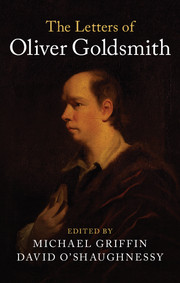24 - To David Garrick, London, 20 July 1767
Published online by Cambridge University Press: 12 December 2024
Summary
David Garrick (1717–79), actor and playwright, was also manager of Drury Lane which he ran for almost thirty years (1747–76). His London debut as Richard III in 1741 was a sensational success: his naturalistic style of acting was exuberant and energetic, and supplanted the more classical style of older actors such as James Quin. Goldsmith's earlier writings on theatre in the Enquiry into the Present State of Polite Learning and the Bee applaud him as an actor but are more critical of his managerial practices. Garrick, in turn, had refused to support Goldsmith for the position of secretary to the Society of Arts and Sciences so their relationship was always awkward. Garrick would continue to be associated with Shakespearean roles throughout his career and was instrumental in the Shakespeare Jubilee in 1769. He collaborated successfully with George Colman when the pair wrote The Clandestine Marriage (1766), the comedy for which he is best remembered as a playwright. He retired from acting in 1776 after a series of farewell performances and he sold his share of Drury Lane to a consortium led by Richard Brinsley Sheridan.
Garrick had turned more to management and writing at the date of this letter’s composition. Goldsmith had submitted the manuscript of The Good Natur’d Man for his consideration despite their lukewarm relations, perhaps because the management situation at Covent Garden was uncertain following the retirement of John Rich. Garrick vacillated for a period before agreeing to meet with Goldsmith to discuss changes to the play, but the nascent dramatist refused to submit to Garrick's requested amendments. When Colman agreed to stage the comedy, Goldsmith wrote this politic letter to smooth things over with Garrick, whose friendly response seems to indicate that he held no grievance.
The copy-text is the manuscript in the New York Public Library. It was first published by Prior in 1837. It is addressed ‘To | David Garrick Esqr. at | Litchfield’. There are two postmarks dated 20 and 21 July respectively. It is marked by Garrick on the front, perpendicular to the address: ‘Dr Goldsmith's | Letter wth.
- Type
- Chapter
- Information
- The Letters of Oliver Goldsmith , pp. 71 - 73Publisher: Cambridge University PressPrint publication year: 2018

